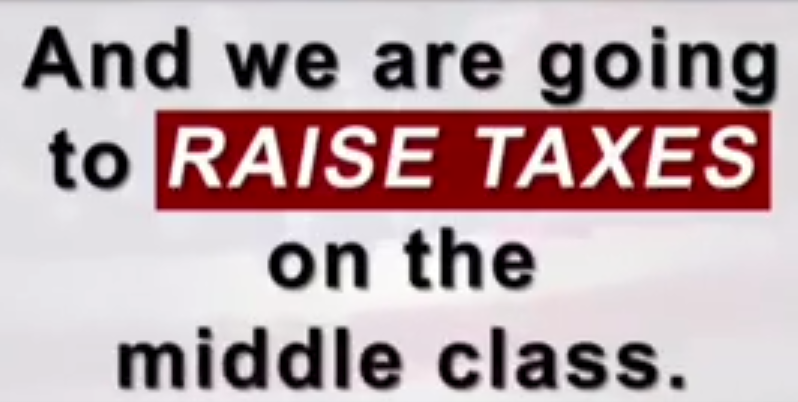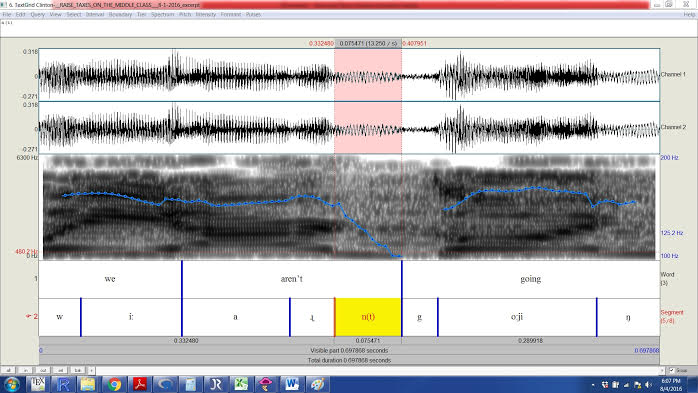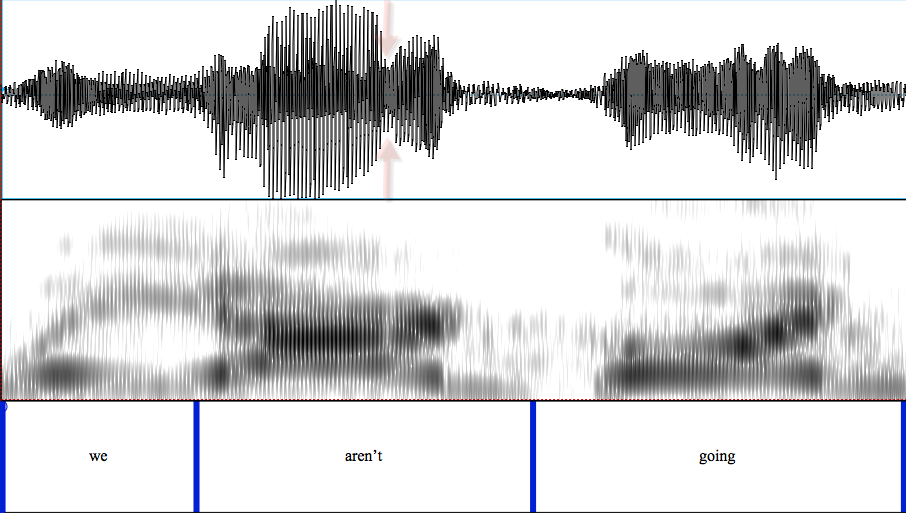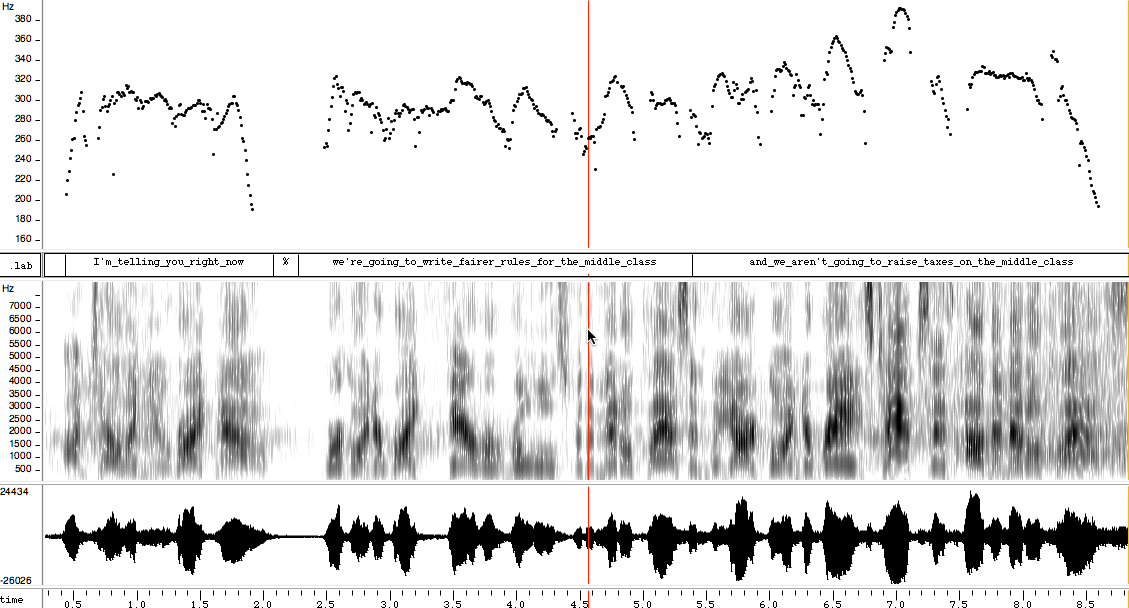Political /t/ lenition
« previous post | next post »
PolitiFact recently took up the case of a Donald Trump campaign video that shows Hillary Clinton apparently announcing her intention to raise middle class taxes (Linda Qiu, "Donald Trump wrongly says Hillary Clinton wants to raise taxes on the middle class", PolitiFact 8/5/2016). The crux of the matter is this passage.
I’m telling you right now,
we’re going to write fairer rules for the middle class,
and we aren't going to raise taxes on the middle class.
The Trump video subtitled it this way:
After listening to the original recording, talking with various reporters who were there, looking at the distributed transcript of Clinton's speech, and consulting with two phoneticians, PolitiFact rates the Trump campaign's version as (liar, liar) "Pants on Fire".
It's a well known problem with the English language, at least as spoken by many 21st century Americans, that can/can't and are/aren't are often nearly indistinguishable, especially preceding a consonant, due to lenition or even deletion of the final /t/. You can listen to the crucial region of Clinton's performance, and hear this problem for yourself:
I agree with PolitiFact's conclusion, and with Alan Yu's explanation:
"It is pretty common for people to not release the final ‘t in word-final -nt clusters and is definitely not likely for someone to release the ‘t’ in a three-consonant sequence like ‘ntg’ in ‘aren't going,’" Yu told us. "In any case, since she did pronounce the ‘n’ in ‘aren't’, it is clear that she produced the negated form of the copula ‘are.’"
But the Praat screenshot that Alan Yu sent them evokes two of my pet Praat peeves:
(1) The waveform display in the top pane shows two (stereo) channels that are completely identical, as is often the case with digital media. At best this reduces the quality of the visual display, and at worst it's confusing to viewers.
(2) The spectrogram display in the middle pane retains (I think) Praat's default dynamic range of 70 dB, as a result of which most of the displayed information is noise — as visible in the fact that the spectrogram is mostly different shades of black, because this setting maps the grey scale as black for the loudest sound, and white for a power level 70 dB below that. To really get 70 dB signal to noise ratio (a ratio of 20,000,000 between the amplitude of the signal and the amplitude of the noise), you'd need to record in a sound-treated booth with a super quality microphone and preamp. A recording of a speech like Clinton's, made over a large room's sound system might attain 40 dB between the loudest and softest parts if you're lucky — in this passage, the range is about 37 dB, so that recorded "silence" is still halfway to black in the spectrogram above.
None of this is Praat's fault (except for the optimistic default dynamic range setting). Here's a display, also made with Praat, showing just one copy of the waveform, and setting the spectrogram dynamic range to 33 dB:
This illustrate's Alan's point more clearly, I think — at least for an audience with some basic training in spectrogram reading, which alas PolitiFact's readers mostly are not.
One more interesting thing. There's a sort of hitch in the signal amplitude about 50 milliseconds before the [n] closure, at the point indicated by the red arrows in the waveform display. I suspect that this is a bit of glottalization. The phonetic interpretation of the /ntg/ sequence in "aren't going" would often involve a glottalized /t/, which would often merge with the /n/ into a glottalized nasal.
Apparently in this case, the glottalization gets a bit out of sync with the closure. I wonder whether this is a general thing, with Clinton or others, or just a one-time event.
And then on a somewhat different topic, there's a something to be said about the intonation contours of Clinton's speechifying style — as opposed to her interview style. Here's the pitch contour of the segment we started with (using displayed using WaveSurfer, a program whose pitch displays are easier to see):
I'll take that up another time — but for now, take a look at Daniel Lombroso and Olga Khazan, "The Science Behind Hating Hillary's Voice", The Atlantic 8/1/2016.




David Morris said,
August 7, 2016 @ 6:32 pm
As a matter of pragmatics (linguistic and political), this would be a very strange way to state a intention to raise taxes on the middle class. "We're going to write fairer rules (that's a good thing) *and* we are going to raise taxes (that's a bad thing)".
Some people use "we're not" instead of "we aren't". If she had, the problem wouldn't have arisen. (Google Ngrams shows that "we aren't" is still more common in AmEng, despite a decline in its use and a rise in the use of "we're not".
[(myl) Certainly in this case "we're not" — or emphasis "we are NOT" — would have been a better choice.]
Martin D. said,
August 7, 2016 @ 7:01 pm
Not all Americans fail to distinguish "can" from "can't" before a consonant. At least New Yorkers (judging by my accent) have a different vowel in the two words: "can" has the "A" of "marry", whereas "can't" has the "A" of "Mary". I easily hear the difference between e.g. "I can do it" (with the emphasis on the "can") and "I can't do it", even though I don't pronounce the "T" in "can't" in that sentence.
Bathrobe said,
August 7, 2016 @ 8:02 pm
It certainly sounded to me like "we are going to raise taxes on the middle class".
I don't totally agree with David Morris's comment. It's only a matter of "pragmatics" if it is assumed that everyone understands the background. I've had the experience, more than once, of reading documents where I could not understand what was being said due to lack of background, that is, not knowing where people are coming from. The more parochial or obscure the discussion the harder it is to grasp the point.
Ellen K. said,
August 7, 2016 @ 10:29 pm
Definitely sounds like "aren't" to me. Though I can understand that someone who's native accent is more different from hers than mine is might not find it as clear.
AntC said,
August 8, 2016 @ 3:49 am
Thank you for the link to "Hillary's Voice".
I remember Margaret Thatcher's voice deepened and became more breathy as she ascended the political ladder. Presumably voice-coaching.
Keith said,
August 8, 2016 @ 6:53 am
:sign:
You know, I was going to say that if Clinton can't give a clear statement about future tax policy, how can we trust her to be a good president? I mean, if she can't even say "aren't" clearly, how is she going to negotiate treaties? Believe me, I was going to say that, but I won't, you know? Because, well, I just can't even.
Karen said,
August 8, 2016 @ 8:55 am
Martin says ""can" has the "A" of "marry", whereas "can't" has the "A" of "Mary"."
Lots of us have the exact same vowel in "marry" and "Mary". :-)
Jarek Weckwerth said,
August 8, 2016 @ 12:25 pm
Correct me if I'm wrong, but isn't the are* thing stressed? If so, it would stand in a weird kind of contrast with the unstressed and contracted are a couple of words upstream, especially seeing that the conjunction is and and not but.
Which makes me 90% certain that I hear aren't.
Second Responder said,
August 8, 2016 @ 12:40 pm
Isn't stress what listeners primarily use to distinguish between CAN (unstressed) and CAN'T (stressed)? Same for ARE/AREN'T. Had Hillary stressed AREN'T, she would have made the contrast with the previous WE'RE more emphatic.
bzfgt said,
August 8, 2016 @ 12:44 pm
Karen, that is a degenerate form of English pronunciation you should be working to overcome.
Ellen K. said,
August 8, 2016 @ 1:07 pm
Bbfgt, that is standard American English. That is, the majority of U.S. English speakers pronounce marry, Mary, and merry alike. And additionally some pronounce marry and Mary alike who don't pronounce all 3 alike.
Degenerate in one sense, yes, I suppose, but not at all degenerate in the sense you seem to mean (based on you saying we need to overcome it).
Ellen K. said,
August 8, 2016 @ 1:17 pm
Curious where the people who hear anything other than a clear "aren't" there are from. Are there dialect/accent differences that come into play here? It seems kinda pointless reading all these different opinions without knowing anything about the variety of English of the commenters.
Me, grew up near St. Louis, with parents who were born and raised in the Chicago metro, as Hillary Clinton was.
J.W. Brewer said,
August 8, 2016 @ 1:43 pm
It would be interesting to know whether the ratio between "we aren't" and "we're not" is different for writing versus speech, since the risk of ambiguity identified here doesn't arise in writing. But there may not be enough speakers who are sufficiently conscious of the risk of ambiguity to have trained themselves to avoid it?
These two alternatives don't strike me as any different registerwise in level of formality, but YMMV.
L said,
August 8, 2016 @ 1:45 pm
I feel like maybe bzfgt was joking, but if not, then – I say "Mary," "marry," and "merry" identically, and I have no plans to "overcome" this.
L said,
August 8, 2016 @ 1:48 pm
The "pants on fire" designation is deserved, as proved by this Trump ad:
https://www.youtube.com/watch?v=qML9ynFP7L8
Pay especial attention to 0:13.
If the Trump campaign actually believed Clinton was saying "are," there would be no need for that clumsy edit. The edit shows that they know better.
Bathrobe said,
August 8, 2016 @ 5:06 pm
I'm from Australia. What this tells me is that there are U.S. pronunciations where I can't pick up differences that have a fundamental impact on sense. Of course people born in the right areas of the U.S. will hear the difference, but it's almost imperceptible for others. Now I know what it feels like being a non-native speaker learning English!
Filter Fodder said,
August 8, 2016 @ 6:51 pm
@Martin D.: "New Yorkers (judging by my accent) have a different vowel in the two words"
So you have 2 'short a' phonemes. Just providing the Wikipedia link in case anybody doesn't know what that is about:
https://en.wikipedia.org/wiki/Pronunciation_of_English_%E2%9F%A8a%E2%9F%A9#Distinction_between_phonemic_and_non-phonemic_.2F.C3.A6.2F_tensing
About Hillary, listening to just the word itself, it does sound like "aren't", but the way she gives it to little stress sounds kind of strange to me, and definitely makes it easier to hear it as "are".
Alyssa said,
August 9, 2016 @ 2:31 am
To my ears, I can hear the glottal stop (is that the right term?), but it's ambiguous whether she's saying "aren't" or just saying "are" and then pausing. It sounds a bit like what happens when you "swallow" what you were next going to say.
In isolation I parse this as "aren't" but the parallelism with the previous clause "we are […] and we aren't […]" led me to hear it as "are" when listening to the full clip. I'd have expected some amount of emphasis on the negative, eg "we are […] and we are NOT […]", to mark this as a contrast. Without that cue, it's easy to chalk it up to a moment of disfluency.
Richard said,
August 9, 2016 @ 8:41 am
I always train my int'l teaching assistants to stress negated contractions (aren't, can't) and unstress non-negated auxiliaries (are >'re, can > kin/k'n) because they are so hard to distinguish, even between speakers of the same dialect and accent. This example will be an excellent one to use in class.
Bloix said,
August 10, 2016 @ 1:23 pm
Martin D. – I have a vowel distinction too (not quite marry-Mary, as my Mary "a" is open-mouthed – "Mairy" – while my can't vowel is more closed) and I have a difference in the n as well – in can, the vocalization of the n is sustained, while in can't the n is vocalized briefly and then the air-flow is cut off abruptly so that there is a brief silence. But I don't say the t at all.